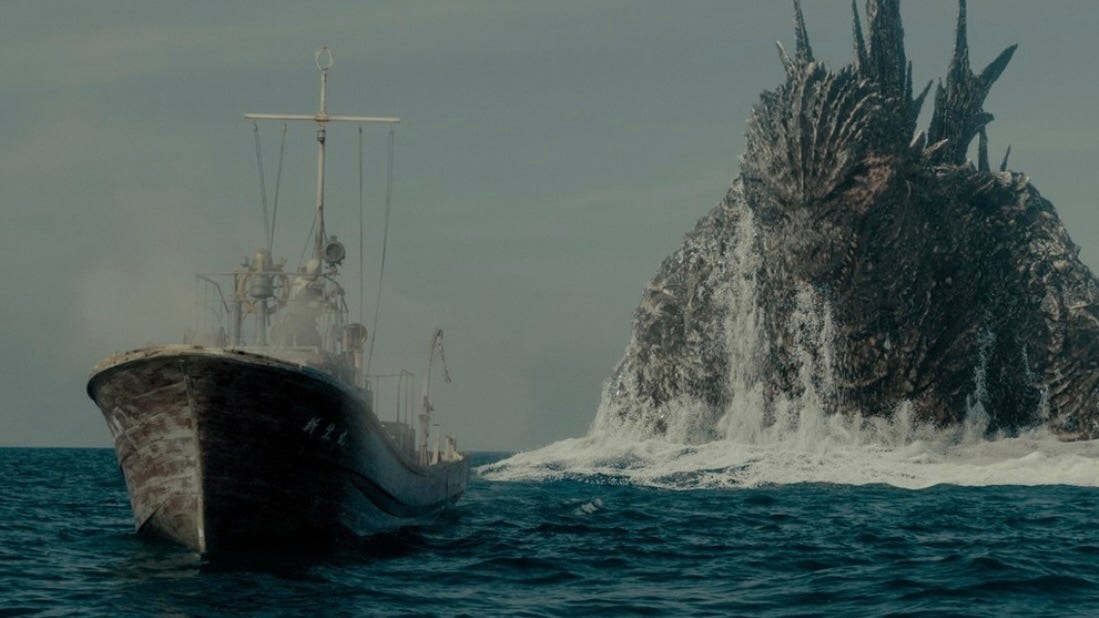Hi all. No, I haven’t abandoned the blog, but it’s hard to muster the time and energy to write about certain things sometimes. I promise I’ll get the next Simpsons review out soon, but I do want to try something else on this blog- this was never just about television, after all.
Film is one of my biggest passions, if not my biggest, period, and with my current situation, it’s been easier for me to find time to see movies, even going to the theaters. I’d like to talk more about film, so maybe I can take time to talk about some of what I’ve seen recently. These won’t be formal reviews, just a few scattered thoughts as I try to sell y’all on movies that I find interesting.
Recently, I rewatched Godzilla Minus One, the most recent edition to the legendary kaiju franchise’s Japanese release. The film previously blew me away when seeing it on the big screen last year, and it translates quite handsomely to a smaller screen… even if you should opt for the biggest possible viewing.
What I think works so well about Minus One, to the point that I’ve seen it catch on with people who have minimal personal experience with Godzilla, is how it takes the franchise back to its roots, trimming as much fat out as possible. While many fans will say that most of that fluff is appealing, like Godzilla’s many monster companions, keeping him the singular entity helps to balance his scale. He looks absolutely massive, whether it’s a sea attack or when he’s roaming the city, and it allows the monster to appear as threatening as he used to before new challengers came to claim the throne.
More importantly, however, is the film’s story, which focuses on Kōichi Shikishima, a kamikaze pilot during WWII who struggles to live up to his expectation, as he carries shame with him; shame for surviving and shame for not stopping this terrifying monster when given a chance to fight back. Shikishima returns to his village to find nearly everyone he knew to pass, aside from childhood friend Noriko and an abandoned infant she found in the rubble. The three start a family while Kōichi finds work on a naval minesweeper, where they’ll soon encounter the lizard monster in the sea, awaiting his next attack.
We get our prerequisite scenes of Godzilla walking Tokyo, while he wrecks havoc to a society still struggling to return to their culture following a brutal war, which reflects the original 1954 Godzilla more than many of the franchise’s following films ever did, although the use of metaphors slightly differs here. In the original, he represents nuclear weapons, particularly the atomic bomb, and the the effect the bombings of Hiroshima and Nagasaki still had on Japan a decade later, but in Minus One, Godzilla appears to represent PTSD itself, the dread that Japanese soldiers and citizens continue to feel after this monstrous attack on humanity. In both films, the monster is an integral part, but the human protagonists are more important. Shikishima’s character arc in Minus One feels real and deserved as he attempts to accept and find his place in the aftermath of his deflection, both on the battlefield and in his new family structure.
Legendary Entertainment’s recent American Godzilla films have their charms- this spring’s Godzilla x Kong: The New Empire was a pleasant enough blockbuster- but comparing them to Japan’s take on the monster, their most recent works in particular, is like comparing amateurs to the real thing. No competition whatsoever. The human stories in America’s Godzilla features in particular feel melodramatic compared to the real tension explored in both Minus One and 2017’s Shin Godzilla.
Also worth exploring is director Takashi Yamazaki’s influences, which includes the franchise at large, but also some American works, particularly Steven Spielberg’s; a research room sequence during the film’s halfway point especially recalls the iconic townhall scene from Jaws. While Yamazaki is reverent and thoughtful to his nation’s beliefs and attitude towards WWII and kaiju, he clearly follows some influence from western media as he frames the story. If anything, I think this would make for a worthwhile pairing with last year’s Oppenheimer, which focuses almost exclusively on the US’s experience with nuclear weapons.
Godzilla Minus One is currently streaming on Netflix. A Blu-Ray release, largely echoing the Japanese release complete with subtitle-less bonus disc, is available for preorder.



